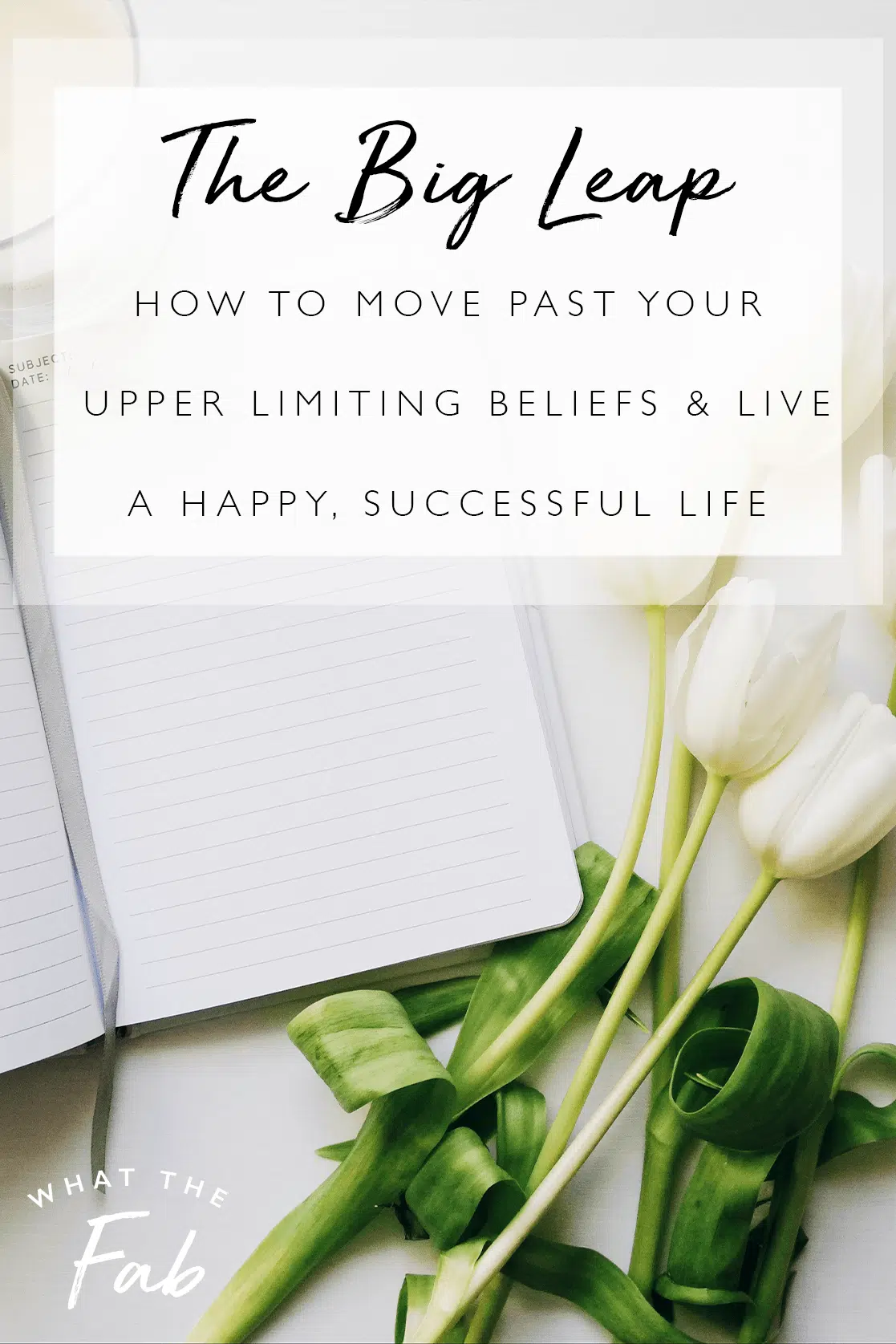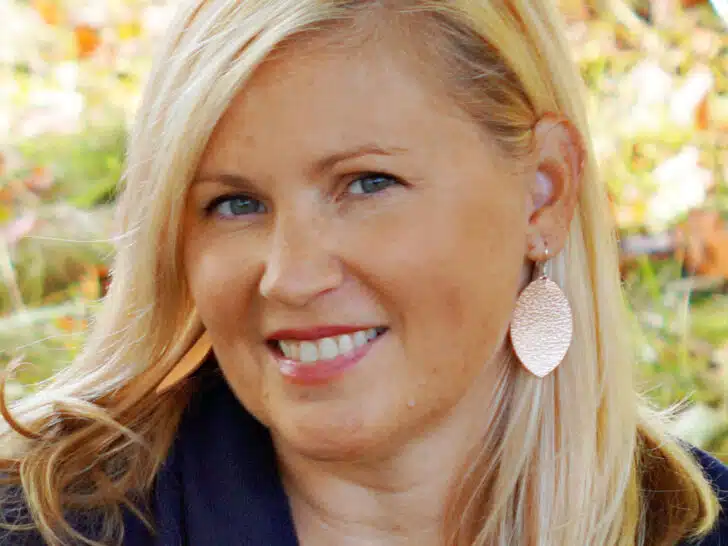
Listen to the episode:
You can also listen on: Apple Podcasts | Spotify | Google Podcasts
22: In this episode, I’m breaking down Gay Hendrick’s book The Big Leap with a Big Leap summary to bring you the cliff notes version of it so you can get all the highlights!
In this episode we discuss:
– How to identify your Upper Limit Problem—we all have one problem that holds us back from success and happiness
– The four hidden barriers that we use to limit ourselves and how to transcend them
– How to identify and live in your zone of genius
– What “Einstein time” and how to shift your relationship with time to be more abundant
– How to create an ultimate success mantra and live by it
Snap a screenshot of the podcast and tag me @wtfab sharing your thoughts on this episode, so I can reshare it on my Stories too! Make sure you subscribe to the podcast to stay up to date on the latest episodes and interviews. Lastly, please rate and review to support this podcast!
Quick links from the episode:
Listen to my most recent episodes and find more What The Fab Podcast episodes here! >>
How to See Giving and Receiving Feedback as a Gift
The One Where I Read from My Middle School Diary
My Best Time Management Tips: Ivy Lee Method + Time Blocking
The Big Leap Summary: Episode Transcription
Today we’re doing a cliff notes version of The Big Leap, by Gay Hendricks. It was recommended to me and the Shine Mastermind group by Julie Solomon.
It’s a super easy read and I definitely recommend grabbing a copy.
I did a cliff notes style podcast on the book Atomic Habits as one of my first episodes, and now it’s one of my most-listened-to episodes. I think the appeal is that we don’t have time to read a ton of books each month and you can easily get a quick summary of a book that interests you by listening to an hour-long podcast.
You can do this while you’re driving or doing the dishes. You can also learn something from it and take action to then dive deeper into that book later on.
So that’s my goal with these book summary podcast episodes. I go through and read the book, highlight and dog-ear the crap out of it, and then distill that information for you into an episode.
So you can learn on the go and then dive into the book yourself if you feel so inclined.
Ok so let’s get into The Big Leap and my Big Leap book summary. The main tenet of this book is that we all have one problem that holds us back from success and happiness, and he calls it the Upper Limit Problem.
The more successful people become, the more important it is to identify and overcome your Upper Limit Problem.
Once you understand your Upper Limit Problem and how to solve it, Hendricks suggests that you can not only increase your wealth and financial success, but you can also make huge shifts in the amount of love you feel in your life and the amount of creativity you’re able to express.
That’s really the key—that life is at its best when love, money, and creativity are all growing in harmony.
So this Upper Limit Problem is the idea that we tend to sabotage ourselves from reaching our full potential, highest happiness, or success. It kind of sounds crazy and makes me wonder why would we do that to ourselves?
But it’s important to note that it’s not intentional. It has to do with the negative and limiting beliefs that are formed during our childhood.
We take it as truth and never question it for the rest of our lives—it becomes a hidden ceiling. And when you reach a certain level of happiness or success, that is your upper limit that you’ve unconsciously set for yourself.
You find a way to deflate and bring yourself back down. Hendricks calls this your inner thermostat setting that determines how much love, success, and creativity we allow ourselves to enjoy.
So let me give you some examples of this:
In the book, Hendricks says that when he would reach his Upper Limit of how many positive feelings he could handle, he would create a series of unpleasant thoughts to deflate himself. Those thoughts were guaranteed to make him return to a state he was more familiar and more comfortable with.
This really struck a chord with me and I could think of a few examples in my life. I’ll be with Omied and be completely blissed out, then suddenly I get extremely morbid thoughts like what if he gets cancer or dies randomly—this happiness isn’t going to last.
Sometimes I’ll feel happy and content literally doing nothing. Once I feel that feeling of being content, I think to myself well why do you feel happy right now or that feeling isn’t going to last.
Omied had an example of when we’re on vacation and we still have a week left his mind starts to think the vacation is already over.
Other examples could be every time you hit a big financial goal or success with your business, you end up picking a fight with your spouse. This was a common example from some of the women in my mastermind group.
So the idea now is, what do we do with this? How do we identify and move past our Upper Limit Problem? And is it really possible to consistently feel good and have things go well in life all the time?
So if you’re like me you’re thinking, no that’s not possible. But Hendricks writes that if you’re thinking that, you should put that thought aside and not waste your time worrying about whether or not it’s possible.
In his work, he’s proven that it is possible, so the only relevant question to ask yourself is if you’ll let it be possible for yourself.
If you’re committed to taking your Big Leap, you’re going to have to show your ego the door. Which will be hard and your ego won’t go quietly, because it’s had a lifetime of employment with you.
So we can start by focusing on the positive things and feelings in our lives right now. Give that positive feeling your full attention and allow it to expand so you can enjoy it for as long as possible.
This is just a form of gratitude—you might already have some kind of gratitude practice in your life. For me, I write down 3 things I’m grateful for every morning.
It’s definitely something I can focus more of my thinking on. An example Hendricks gives that I really liked was, around money.
So instead of waiting to feel good until you have all the money you want, take time right now to appreciate your current money supply.
Find a place within yourself where you can feel good about the money you have and create positive thoughts around it. So a thought like “I enjoy the money I have,” or “I always have plenty of money to do everything I want to do.”
You can create these positive thought patterns around other areas of your life like love and relationships. That’s a good starting point, but then he also talks about identifying your different Zones.
So you have Zones of Incompetence, Competence, Excellence, and Genius. The goal is to be operating in your Zone of Genius.
Your zone of incompetence is made up of everything you’re not good at and don’t enjoy. The best way to handle this zone is to free yourself from doing these things altogether.
Delegate them or find a way to avoid doing them. For me, that would be things like my taxes, or the tech and web development of my website. In my personal life that would be cleaning my house.
Your Zone of Competence includes things you can do, but others can do them just as well and you likely don’t get any joy out of this. It’s easy to expend too much time and energy into this zone.
So for me when I think about this zone, I think about how I just hired an amazing assistant (shout out to Vicki!), and how I really should have hired her sooner because she takes on a lot of things that are in my zone of competence, but she does them just as well—if not better.
That frees up my time to do other things that are in my zone of genius. So that would be things like bookkeeping, invoicing, researching brand contacts, and managing my inbox.
That’s all stuff that I can do and do it well, but I don’t need to be the one doing it.
Your Zone of Excellence is the things you do extremely well. You can make a good living working in this zone and for highly successful people, it can be a very seductive zone that you can get trapped in.
It’s dangerous because staying in this zone keeps you from taking the leap into your zone of genius. It’s tempting to stay in your Zone of Excellence—it’s comfortable—your friends and family want you to stay there because you provide a steady supply of all the things they thrive on.
Your Zone of Genius is where Hendricks says you’ll find your ultimate path to success and life satisfaction. It’s where you’re doing activities that you are uniquely suited to do and that draw on your special gifts and strengths—the goal is to get here.
Let’s talk about what triggers the Upper Limit Problem. Hendricks says there are four hidden barriers based on fear and false beliefs.
Everyone has one, and some people might have two or three. These hidden barriers are all based on beliefs about ourselves that seem to be true and real, but they’re not.
We unconsciously take them as true or real and that’s what holds us back. So let’s get into these four hidden barriers.
The first hidden barrier is feeling fundamentally flawed. You might have an upper limit mindset like, I cannot reach my full creative genius, be fully happy, or reach financial success because something is fundamentally wrong with me.
Like I’m flawed, I’m wrong, I’m bad, so how can I possibly be this happy, rich, creative, whatever?
Hidden Barrier number 2 is Disloyalty and Abandonment. So you might have an unconscious mantra that goes like this, “I cannot expand to my full success because it would cause me to end up all alone, be disloyal to my roots, and leave behind people from my past”.
The third hidden barrier is believing that more success brings a bigger burden. Meaning, more money more problems.
Your upper limit mantra could be, “I can’t expand to my highest potential because I’d be an even bigger burden than I am now”.
And the last hidden barrier is the crime of outshining. A mantra for this one would be, I must not expand to my full success, because if I did I would outshine my spouse, my sister, or whomever and make them feel bad.
Now, I’m going to be honest. I personally did not identify with any of these. In the book, he goes into examples for people he’s worked with who have had each of these barriers, and a lot of these thoughts get instilled in childhood.
Like for example, he was seen as a burden because his father died while he was still in the womb, his mother suffered from depression, and he was sent to live with his grandparents for most of his childhood—I definitely see how he carries that third barrier of being a burden with him.
So I encourage you to reflect, see which one or ones you relate to, read more about each one, do some journaling, I’m going to as well. But now that we have a look at these hidden barriers, let’s get into how to spot the Upper Limit Problem in daily life.
There are a few typical ways we upper-limit ourselves, and the first one is Worry. Worrying is usually a sign that we’re upper-limiting ourselves and we’re usually not thinking about something useful. The crucial sign we’re worrying unnecessarily is when we’re worrying about something we have no control over.
When things are going well for us, our Upper Limit kicks in and we suddenly start worrying about things going wrong in some way. Those worry thoughts just breed more worry thoughts and we create these scenarios in our head where everything falls apart.
I do this to myself when my business is doing really well financially. It’s like I can’t take it in and enjoy a financial milestone for long because I start worrying, well what if the next month my business doesn’t do as well? Or, well this financial success can’t last forever, next year might not be as good.
But here’s the thing—almost none of our worried thoughts actually have to do with reality. So to decide if a worry thought is actually something you should pay attention to, ask yourself:
Is it a real possibility? And Is there any action I can take right now to make a positive difference?
I’m going to practice asking myself this so I can let go of these worrying thoughts as much as possible. When things are going well or you’re feeling particularly good, you can always bring yourself back down by creating a stream of worried thoughts.
So moving on to the second way we can upper limit ourselves, and that is through criticism and blame. So Hendricks says that self-criticism and criticizing others are the same and both are part of the same upper limit pattern.
They’re both addicting behaviors and easy ways to mess up the flow of positive energy. Similar to worrying, criticism is only useful if it’s directed at a specific thing to produce a useful result.
This was another upper limiting behavior that I related to. I can be very hyper-critical of myself, and others around me—like we hold others around us to the same standards we hold ourselves. So if I’m being critical of myself, why wouldn’t I be critical of those close to me?
But what does that do? I think it’s good to have high standards and to always strive to be better, but to constantly criticize or feel the need to place blame, I can def see as an upper limiting mechanism.
The third upper limiting behavior is deflecting, and that is where we stop the flow of positive energy but avoiding it together. You do this if you can’t take a compliment. Like you get uncomfortable, or you even go so far as to negate the compliment. So for example someone compliments you at work and says you did a great job on a presentation, and you respond with, ah you know I ran out of time and messed up one section.
Instead, try to gracefully accept the compliment and savor that positive feeling. Respond with, thank you, I worked hard on it and I still feel like there were some areas I could have tweaked, but I’m glad it came across well. I think that accepting compliments without deflecting is especially hard for women.
When I worked at Google, they had us do an activity where we would have to write what makes us remarkable and read it aloud to everyone. It feels super uncomfortable in the moment but is super empowering after.
Another upper limiting behavior is arguing. It’s a super common way to bring yourself back down when you’ve hit your upper limit and things are going well.
I shared the example earlier of someone who hits a financial success marker in their business and like clockwork, gets into a fight with her husband. I think just being aware of that is so helpful.
For example, I’m about to upper limit myself by picking a fight so let me go for a walk instead.
Those are a few really common upper limiting behaviors, but there are plenty of others. Some of those would include getting sick or hurt, not speaking important truths to relevant people, not sharing your feelings with relevant people, or not keeping agreements.
So now that we’re aware of these things, we can consciously take a step back when we notice ourselves engaging in these behaviors. We can shift our attention to increasing our capacity for love, abundance, and success.
Think about a new story you can tell yourself that involves you enjoying your life in all of your glory and your full potential—lean into that feeling.
So at this point, we’re over halfway through the book and the next couple of sections are all about identifying and living in your Zone of Genius, as well as a section on Einstein Time which we’ll get into.
When it comes to finding your Zone of Genius you’ll want to ask yourself and reflect on a set of questions:
What do I most love to do?
What work do I do that doesn’t seem like work?
In my work, what produces the highest ratio of abundance and satisfaction to the amount of time spent?
What is my unique ability?
These are all in an effort to identify, what is my genius and how can I bring forth my genius in ways that serve others and myself at the same time?
To be clear, when we’re talking about your unique ability, that doesn’t mean you’re the only person on the planet with this ability. Millions of other people might have this special ability, but it’s probably rare within your circles and it’s probably something that you’re so innately good at that you might not even see it as a skill set at first.
It’s just part of your nature. It might be something that made an appearance early on in your life when you were a child.
The other thing that Hendricks called out that made me feel better is that you can commit to living in your Zone of Genius, even if you’re not exactly sure what that is or what that looks like just yet. I was like, ok phew, because I’m not entirely sure what mine is.
I’m still reflecting on some of these journaling prompts, but I feel like it has to do with creating—like content for my blog or podcast—and creating in a way that inspires other people to take action in their daily lives.
When I receive messages from you all telling me that I inspired you to reframe their lifestyle—that’s when I feel super lit up inside.
Ok, so you’ve committed to living in your zone of genius, you’re determining what that means for you and what your unique gift is, so then how do you stay living in your zone of genius?
Hendricks sees this as a continuous spiral, going higher and higher. It’s like the Mean Girls quote, “the limit does not exist”.
One key factor he has found to help with this commitment of living in your zone of genius is to have a mantra that is like your guiding principle—he calls it your Ultimate Success Mantra. So it’s what you use to center yourself, your mind, your actions and decisions.
I expand in abundance, success, and love every day, as I inspire those around me to do the same.
So this is what he uses and has refined over decades of working with thousands of people, but you can tweak it, make it your own, do what feels good to you. But the idea is that whatever your ultimate success mantra is, it tells you to expand, rather than contract or remain the same.
You can use your mantra formally in meditation practice or informally as you go about your day.
You can also write your mantra on sticky notes and post it in various places you’ll see it throughout the day. You can put it on your desktop background to make it your phone’s wallpaper.
I’ve edited the name of my alarms on my phone to be my mantra, so it’s the first thing I see when I wake up. I’ve also made some cute, free downloadable backgrounds for your phone or your lock screen, with this mantra on it.
One of the last chapters is about living in Einstein Time. The idea is that you need to develop a harmonious relationship with time for your life to work harmoniously.
Most of us, including myself, have a difficult relationship with time and balancing all of our priorities. We have a very Newtonian view of time—there’s a finite amount of it, and it has to be carefully portioned out so there’s enough to do the things we need to do.
It’s a scarcity mindset when it comes to time, which leads to this uncomfortable feeling of urgency. This is 100% how I feel about time.
It’s a commodity, I don’t like people wasting it, there’s never enough of it, I feel like I’m racing against it. So instead, Hendricks asks us to adopt Einstein Time, in which time is abundant and expansive, and here’s the kicker, “you are the source of time”.
I’ll be honest, I read that and I was very confused. It just sounded really woo to me, and not true. Time is time and there are only so many hours in a day.
But the more I thought about it the more I could think of examples where time is relative and cultural—it’s a construct.
When I was in India working for Google, the culture there is just so different when it comes to time. Some of my co-workers would spend 30-minutes catching up in their free time and I could never understand because I always felt like there’s not enough time to finish everything in a day.
I realized that in India, they view time circular and that there’s always going to be time to complete tasks to get the work done.
So thinking about that kind of opened my mind to thinking about how the way that I have viewed time my entire life is not the only way to view time.
Hendricks shares the example of Einstein explaining his theory of relativity; that time is relative and the rate at which time passes depends on your frame of reference. You’ve heard that Einstein quote when you sit with your beloved for an hour and you think it’s only a minute, but when you sit on a hot stove for a minute you think it’s an hour—that’s relativity.
Hendricks says this is a great example because when you’re forced to do something that you don’t want to do you’re contracting within yourself and away from the pain of the stove. You’re focused on trying to not occupy the space you’re in.
The act of contracting your awareness away from the space you’re in makes time harden. Versus when you’re embracing your beloved, your awareness is flowing in the opposite direction—toward space.
Every cell in your body is just yearning to be in union with the person you’re in love with, your awareness flows out, your consciousness expands into space, and your sense of time disappears. You forget about time.
Now, at this point, maybe you’re like me and hearing this for the first time and you’re like, this all feels very woo and abstract to me. I’m with you on that, but I would encourage you to keep your mind open.
I just finished reading this book a few days ago and just by being open to some of these ideas about time. I already feel a loosening of my grip and need to control my time.
Hendricks goes on to say that when we switch to Einstein Time, we take charge of the amount of time we have, and we realize that we’re where time comes from. This is a liberating thought—if I’m the source of time, I can make as much of it as I need.
So how do we begin? The first step is to get ourselves in harmony with the idea that you’re the source of time. Even if you don’t believe it, act like it’s true.
Tell yourself it’s true. The first day I started doing this, I 100% did not believe it, but I noticed some subtle shifts in how I felt throughout the day.
Whenever I needed to make a time-based decision, I ask myself questions like:
Do I have time to do my full morning routine?
Am I going to have enough time to finish this project today?
I told myself, I am the source of time and it helped me feel so calm and relaxed and just un-rushed.
The other thing you’ll want to try is to stop complaining about time—cold turkey—because complaining about time puts you in the victim position. How many times do we say things like, I can’t believe it’s 4:30 already! How is it already June? The year is half over. I don’t have time to do that right now.
These all come from a scarcity mindset of treating time as a commodity and like there isn’t enough of it. So I’ve been trying to work on that and catch myself before saying these types of statements, which has been an interesting exercise.
The other thing to think about is to notice what time pressure feels like on your body—both in terms of feeling hurried and feeling bored. For me, feeling hurried feels like a buzzing sensation in my body, especially my chest and head.
Feeling bored feels sluggish and heavy. Hendricks called this out in his book and I related to that buzzing sensation of feeling hurried is the same kind of feeling I get when I’m super excited about something.
So it’s no wonder I would choose to feel hurried and that chaotic buzzy sense over feeling sluggish and bored.
That chapter on time was especially interesting and also hard for me. I re-read it before recording this episode and I’m still questioning things, but I do think I’ve made some positive shifts in how I think about time already.
As we wrap things up, Hendricks just reinforces that this is a continuous journey of transcending our upper limits. You won’t just wake up one day and be like ah, my upper limits.
I’ve surpassed them and they’re never going to try to knock me down again. It’s a practice, and each time we transcend the upper limits we make room for more abundance.

Elise Armitage is an entrepreneur and founder of What The Fab, a travel + lifestyle blog based in California. At the beginning of 2019, Elise left her corporate job at Google to chase her dreams: being an entrepreneur and helping women find fabulous in the everyday. Since then, she’s launched her SEO course Six-Figure SEO, where she teaches bloggers how to create a passive revenue stream from their website using SEO. Featured in publications like Forbes, Elle, HerMoney, and Real Simple, Elise is a firm believer that you can be of both substance and style.




